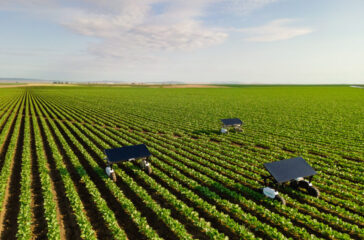In bid to slash chemical use, robots take on farm fields
By Carey Gillam
Cheney, Kan. – On a sweltering summer day in central Kansas, farm fields shimmer in the heat as Clint Brauer watches a team of bright yellow robots churn up and down the rows, tirelessly slicing away any weeds that stand in their way while avoiding the growing crops.
The battery-powered machines, four feet long and two feet wide, pick their way through the fields with precision. Programmed with myriad data points about the field, the artificial intelligence (AI)-driven bots run without any human hand to guide them.
Brauer, a former California-based tech executive who moved back to his family farm in central Kansas after his father developed Parkinson’s disease, sees the robots as critical tools to help farmers reduce their reliance on chemicals and be more protective of their health and the environment.
His Greenfield agricultural technology company now builds and programs its robots in a shed behind an old farmhouse where his grandmother once lived. Farmers who hire the robots are charged a flat rate per acre weeded. Twenty farmers are signed up for the robotic services this season, and the company hopes to weed 10,000 acres this year.
“The answer is here,” he said. “This solves a lot of problems for farmers.”
Greenfield is one of many agricultural robotic companies springing up amid a confluence of concerns over the future of farming. Fears about the harmful impacts of farm chemicals on the environment and on public health are key drivers, as is the need to deal with the diminishing effectiveness of overused weed killing chemicals, labor shortages, and the high costs that farmers face with conventional farming practices.
Financial backing is flowing to these companies from venture capital funds, private investors and large food and agricultural companies eager to make bets on the bots as a means to promote more sustainable food production – a notion increasingly finding favor with consumers.
The investment arm of Chipotle Mexican Grill, a global restaurant chain, is among Greenfield’s investors. Christian Gammill, who leads Chipotles venture fund, said Greenfield’s work is “important and impactful.” Greenfield has raised about $12 million in capital, and is seeking more, according to Brauer.
ReGen Ventures, a venture capital fund operating in Australia and the US, has so far sunk $6 million – with more planned – into North Dakota-based Aigen Robotics, which uses AI and camera vision to sense plants and remove weeds while avoiding crops. Aigen declares on its website to be “building a future with no harmful chemicals in our food.” The compact robots are powered via solar panels fixed to the top of each machine and are designed to work autonomously, sleeping and waking up on farms fields.
“They are well on their way to displacing chemicals from ag and enabling a new, regenerative food production system,” said ReGen founder Dan Fitzgerald.
 EWG
EWG